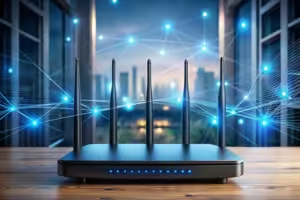In today’s digital landscape, prioritizing networking and security is paramount for businesses of all sizes. Effective networking ensures seamless communication and collaboration within your organization, while robust security measures protect sensitive data from cyber threats. Let’s delve into why networking and security should be at the top of your organizational agenda.
Importance of Networking and Security in Business:
Networking and security are foundational elements that contribute to the overall efficiency, productivity, and reputation of your organization. Here’s why they matter:
1.Data Protection: Implementing strong security measures safeguards your organization’s sensitive data, such as customer information, financial records, and intellectual property, from unauthorized access and breaches.
2.Operational Continuity: Reliable networking infrastructure ensures uninterrupted connectivity and access to critical applications and resources, enabling smooth business operations.
3.Compliance Requirements: Many industries have specific regulatory requirements concerning data privacy and security. Adhering to these standards not only mitigates legal risks but also builds trust with customers and stakeholders.
4.Business Reputation: A secure and reliable network enhances your organization’s reputation by demonstrating a commitment to protecting stakeholders’ interests and maintaining operational integrity.
5.Cost Savings: Proactively investing in networking and security measures can prevent costly data breaches, downtime, and reputational damage that may arise from security incidents.
6. Scalability: Scalable networking solutions allow your organization to grow and adapt to changing business needs without compromising security or performance.
7. Remote Work Enablement: With the rise of remote work, secure networking infrastructure supports seamless collaboration and access to resources for remote employees.
How to Prioritize Networking and Security for Businesses?
To effectively prioritize networking and security within your organization, consider the following steps:
1.Conduct Regular Risk Assessments: Identify potential vulnerabilities and threats to your network infrastructure through regular risk assessments.
2.Implement Robust Security Measures: Deploy firewalls, encryption, intrusion detection systems, and other security measures to protect your network from cyber threats.
3.Educate Employees: Train your employees on cybersecurity best practices, such as strong password management, recognizing phishing attempts, and safe browsing habits.
4.Keep Software Updated: Ensure that all software and systems are regularly updated with the latest security patches and updates to mitigate known vulnerabilities.
5.Monitor Network Activity: Implement network monitoring tools to detect and respond to suspicious activities or anomalies in real-time.
6.Backup Data Regularly: Implement regular data backups to prevent data loss in the event of a security breach or system failure.
Ensuring Effective Networking and Security in your Business:
To achieve robust networking and security within your organization, consider the following strategies:
1.Regular Security Audits: Conduct regular assessments of your network infrastructure and security protocols to identify vulnerabilities and ensure compliance with industry standards.
2.Employee Training: Educate your employees about cybersecurity best practices, such as recognizing phishing attempts, creating strong passwords, and safeguarding sensitive information.
3.Implement Multi-factor Authentication (MFA): Enhance account security by requiring additional verification steps beyond passwords, such as biometric scans or one-time codes.
4.Update and Patch Management: Keep your software, operating systems, and network equipment up to date with the latest security patches to address known vulnerabilities.
5. Data Encryption: Encrypt sensitive data both in transit and at rest to protect it from unauthorized access or interception.
6. Backup and Disaster Recovery: Implement regular data backups and a comprehensive disaster recovery plan to minimize data loss and downtime in the event of a cyber incident.
7. Network Segmentation: Segment your network to limit access to sensitive data and resources based on user roles and permissions, reducing the impact of potential breaches.
Contact Us for Expert Assistance:-
At r1i.technology, we specialize in designing and implementing tailored networking and security solutions to meet your organization’s unique needs. Whether you’re looking to enhance your network infrastructure, strengthen cybersecurity defenses, or ensure compliance with industry regulations, our team of experts is here to help.
For more information or to schedule a consultation, contact us at experts@r1i.technology or call 1300 101 714. Secure your business’s future with our comprehensive networking and security services.
Conclusion
Prioritizing networking and security is not just about protecting data; it’s about safeguarding your organization’s reputation, ensuring operational continuity, and fostering trust with customers and stakeholders. By investing in robust networking infrastructure and implementing effective security measures, you can position your organization for long-term success in an increasingly interconnected and digital world.







